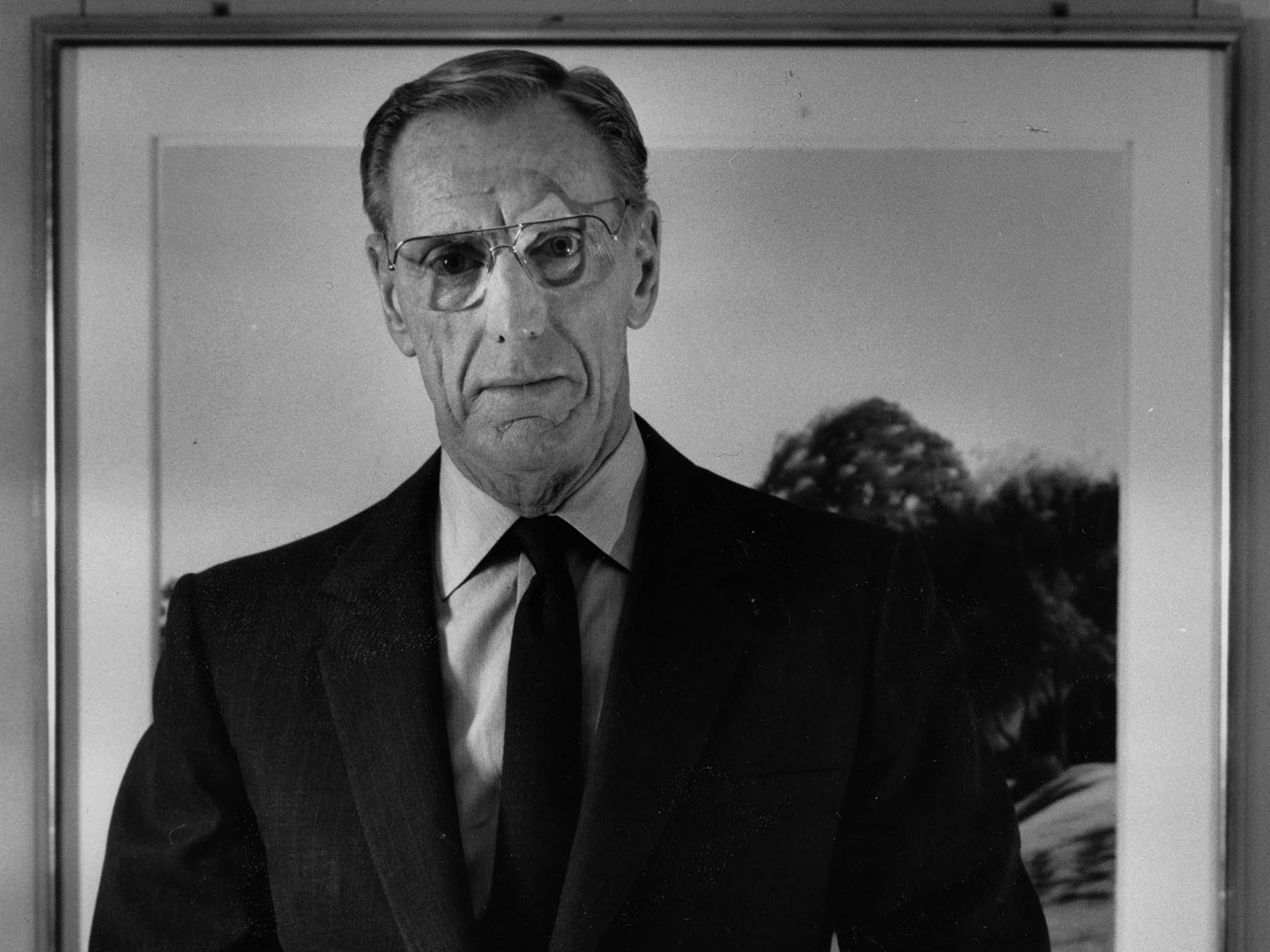Charle Keating: Lawyer and moral crusader who went to jail for his role in the US savings and loans scandal of the 1980s and '90s

Charles Keating was a lawyer and moral crusader who went to prison for fraud as the most prominent figure in the US savings and loan scandal of the 1980s and '90s. Tall, intimidating and ever-defiant, Keating was a national swimming champion in his youth and led anti-pornography crusades from the 1950s onwards. He later became a well-connected businessman who once flew Mother Teresa around the South-western states in his private helicopter.
Keating was also a con artist who had been under federal investigation for financial malfeasance in the 1950s and again in the 1970s. In the 1990s he was convicted of defrauding his company's customers of millions of dollars in order to lead a life of baronial splendour.
He was born in 1923; his father was a dairy-company executive. Trained as a US Navy fighter pilot during the Second World War, Keating did not see combat. He was a national swimming champion at the University of Cincinnati, from which he graduated in law in 1948. His son Charles Keating III, and a son-in-law, Gary Hall Sr, were Olympic swimmers while his grandson Gary Hall Jr, won 10 Olympic medals, including five golds. Keating practised law in Cincinnati with his brother William, a Congressman in the 1970s. One of their clients, Carl Lindner Jr, a Cincinnati tycoon, hired Charles as an executive of one of his companies, American Financial, in 1972.
In 1984, as deregulation swept through the banking industry, Keating borrowed $51m to buy Lincoln Savings & Loan, a California-based company with 26 branches. It became a subsidiary of American Continental, a Phoenix property company controlled by Keating, and had about $1bn in deposits when he took over. He pushed out the old executives and brought in friends and family, paying his 28-year-old son a salary of $800,000. Before his empire came tumbling down, costing taxpayers more than $3bn, he was described in the Los Angeles Times as "a businessman without apparent peer in Arizona in terms of riches, clout and color."
He unabashedly used his political connections to keep regulators from looking too closely at his transactions. In 1985 he asked Alan Greenspan, later chairman of the Federal Reserve Board, to write a brief attesting to Keating's conscientious stewardship of Lincoln.
He contributed heavily to congressional campaigns, including more than $1.3m to five US senators, John McCain, Alan Cranston, Donald Riegle Jr, Dennis DeConcini and John Glenn. In 1987 the so-called "Keating Five" had met Edwin Gray, head of the Federal Home Loan Bank Board, the agency regulating savings and loans, asking him to go easy on Keating. Gray called the intervention "tantamount to an attempt to subvert the regulatory process."
When Keating was asked whether he expected favours from the public officials he supported, he replied, "I want to say in the most forceful way I can: I certainly hope so." Cranston was reprimanded for "improper and repugnant" dealings with Keating by the Senate Ethics Committee while Riegle and DeConcini were admonished for interfering with the investigation. Glenn and McCain were cited for "poor judgment".
Under US law, no more than 10 per cent of the money deposited in a savings and loan can be invested in outside ventures. In 1986, a federal audit found that Lincoln had exceeded the limit by around $600m. His customers, many retired on fixed incomes, were steered toward uninsured securities, or junk bonds.
Investigators accused Keating of running his businesses as a personal piggy bank and ransacking them for risky investments. Between 1986 and 1988 he paid himself and family members $34m in salary, bonuses and stock. He had a helicopter and three corporate jets, including one with gold-plated bathroom fixtures. He bought 20,000 acres in Arizona to build a city that was never completed and built a lavish resort called The Phoenician.
"It was a grotesque and audacious looting of Lincoln Savings & Loan," Michael Manning, a lawyer who handled many of the civil law suits against Keating, said. "He made extraordinarily risky investments with tax-payer dollars." In its report, the accounting firm that investigated Keating noted, "Seldom in our experience as accountants have we experienced a more egregious example of the misapplication of generally accepted accounting principles."
In April 1989, regulators raided Lincoln, which went into bankruptcy along with its parent company. During a four-month trial in California in 1991, Keating maintained that he was the victim of a vengeful government. At one point an elderly woman grabbed his lapels and screamed at him to return her money.
The prosecution brought 53 witnesses against Keating, the defencenone. He was convicted on 17 of 18 counts of fraud and sentenced to 10 years in jail. Two years later he and his son were convicted of racketeering, fraud, conspiracy and transporting stolen property. He was sentenced to 12 years, to run concurrently.
He had served less than five years when the convictions were overturned on technicalities. In 1999 he pleaded guilty to bankruptcy fraud but was spared prison.
MATT SCHUDEL
Charles Humphrey Keating Jr, lawyer: born Cincinnati 4 December 1923; married 1949 Mary Elaine Fette (six children); died Phoenix, Arizona 31 March 2014.
©The Washington Post
Subscribe to Independent Premium to bookmark this article
Want to bookmark your favourite articles and stories to read or reference later? Start your Independent Premium subscription today.

Join our commenting forum
Join thought-provoking conversations, follow other Independent readers and see their replies